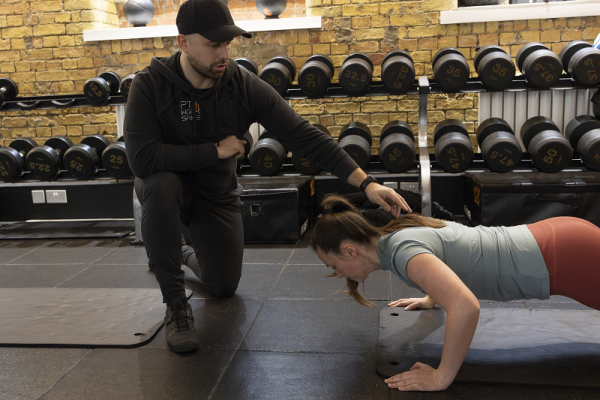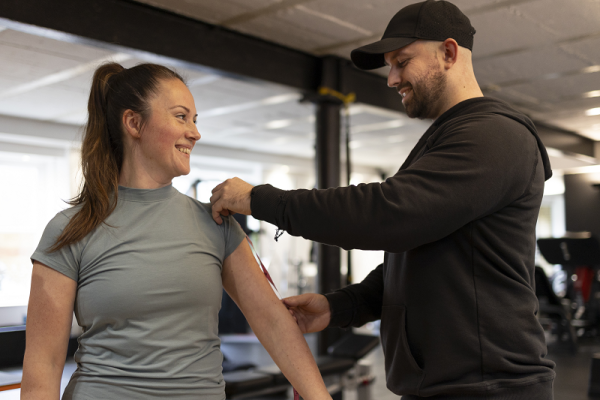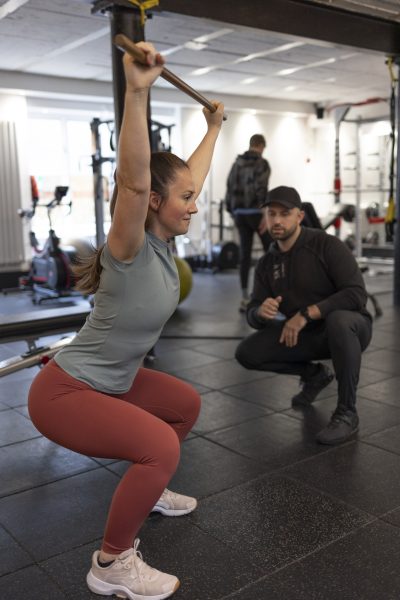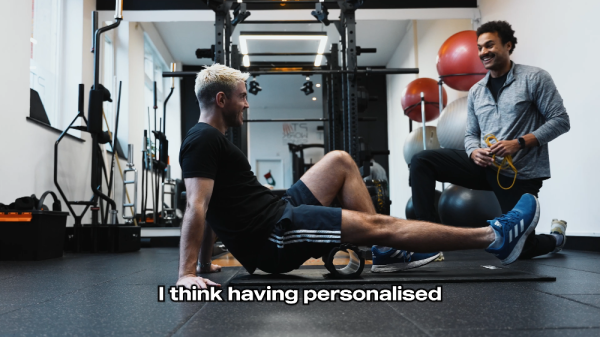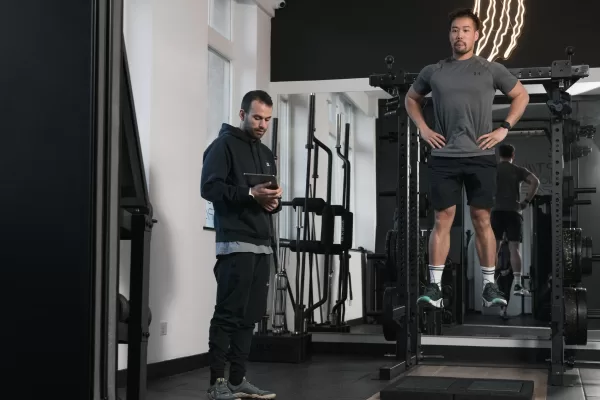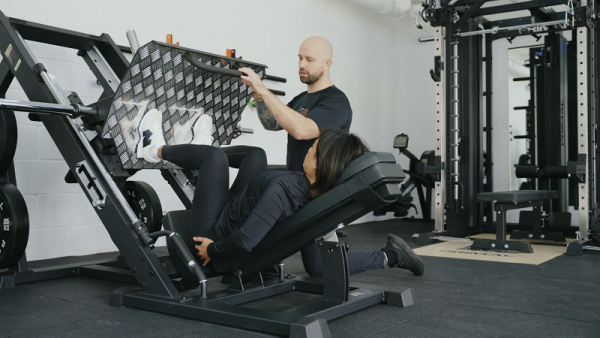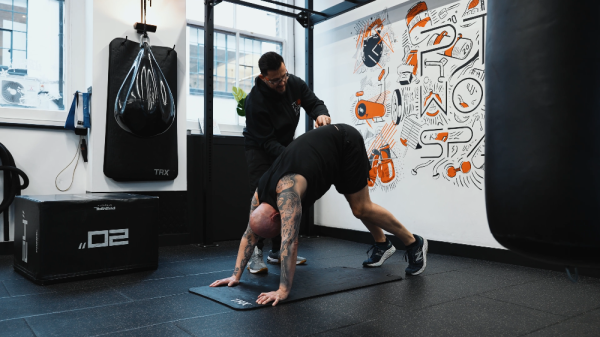What is the role of a personal trainer?
In today’s world, fitness has become an integral part of our lives, with more and more people aspiring to lead healthy, active lifestyles. However, embarking on a fitness journey can be daunting and overwhelming, especially if you’re unsure where to start or lack the necessary guidance. This is where a personal trainer comes in. A personal trainer is a certified fitness professional who plays a crucial role in helping individuals achieve their fitness goals by providing expert guidance, customized workout plans, motivation, and accountability. In this article, we will dive deeper into the role of a personal trainer and how they can transform your fitness journey and how to achieve your health goals faster.
Benefits of Hiring a Personal Trainer
One of the greatest benefits of hiring a personal trainer is the ability to receive customized workout plans that are tailored to your specific needs and goals. A personal trainer will assess your current fitness level, discuss your objectives, and design a plan that addresses your strengths, weaknesses, and any specific considerations. This personalized approach ensures that you’re engaging in exercises that are safe, effective, and aligned with your goals.
Additionally, personal trainers provide invaluable guidance on form and technique. They will teach you the proper way to perform each exercise, ensuring that you maintain the correct posture and alignment. This not only helps to prevent injuries but also allows you to maximize the effectiveness of each workout.
![]()
Goal Setting and Accountability
Setting goals is crucial for success in any fitness journey, and personal trainers excel in this domain. They work closely with clients to establish clear, realistic goals that are challenging yet achievable. Whether your aim is to lose weight, gain muscle, improve flexibility, or enhance overall fitness, your personal trainer will provide the guidance needed to set the right goals.
Moreover, personal trainers serve as a constant source of motivation and accountability. They keep track of your progress, provide constructive feedback, and cheer you on every step of the way. Regular check-ins and progress tracking ensure that you stay committed and focused on your goals.
Education and Instruction
While personal trainers are experts in fitness, their role extends beyond just guiding you through workouts. They also educate and instruct you on various exercise techniques, explaining the science behind them and the specific muscle groups they target. This knowledge empowers you to make informed decisions about your workouts and understand how each exercise contributes to your overall fitness goals.
Furthermore, personal trainers provide guidance on nutrition, recovery, and lifestyle choices that complement your fitness journey. They can help you develop healthier eating habits, optimize your recovery strategies, and provide advice on managing stress or incorporating physical activity into your daily routine. This holistic approach ensures that you’re equipped with the knowledge and tools to make sustainable lifestyle changes.
Personalized Support and Adaptation
No two individuals are the same, and personal trainers understand this better than anyone. They adapt workout plans based on individual progress, preferences, and changing circumstances. Whether you have an injury, prefer certain types of exercises, or require modified workouts due to time constraints, your personal trainer will create a plan that suits your unique needs.
In addition, personal trainers troubleshoot challenges and provide alternatives when necessary. If you struggle with a specific exercise or find it uncomfortable, they will modify it or offer alternative options that are equally beneficial. This personalized support ensures that you remain engaged and motivated throughout your fitness journey.
Motivation and Confidence Building
Motivation often wanes when faced with plateaus or setbacks in a fitness journey. What sets personal trainers apart is their ability to consistently encourage and motivate their clients. They understand the importance of positive reinforcement and celebrate even the smallest victories. This unwavering support keeps you motivated during challenging times and helps you develop the mental resilience needed to overcome obstacles.
Moreover, personal trainers play a crucial role in building your confidence. They push you beyond your comfort zone, helping you realize your true potential. As you see progress and achieve milestones, your self-belief grows, empowering you to conquer new challenges and push your limits.
Can I Get in Shape in 3 Months?
One common question that arises when starting a fitness journey is whether it’s possible to get in shape within a specific timeframe, such as three months. While the answer depends on various factors such as your starting point, fitness level, and dedication, a personal trainer can optimize your progress within the given timeframe.
By working closely with a personal trainer, you’ll receive a focused, efficient workout plan that targets your goals. Additionally, they will provide expert advice on nutrition, recovery strategies, and lifestyle adjustments that can accelerate your progress. However, it’s important to have realistic expectations and understand that fitness is a continuous journey rather than a quick fix. Consistency and commitment to long-term habits will ultimately lead to sustainable results.
Conclusion
Embarking on a fitness journey can be challenging, but with the right guidance and support, you can reach your goals and unlock your true fitness potential. Personal trainers serve as invaluable allies, providing personalized workout plans, motivation, accountability, education, and adaptability. Their expertise and dedication ensure that you’re on the right path to achieving optimum health and well-being. So, if you’re ready to take your fitness journey to the next level, consider hiring a personal trainer and allow them to unleash your true fitness potential.
Check out Emilas Experience with Personalised Fitness Training and what to expect..🧐
Nathan Head Trainer & Founder
P.S If you are interested in finding out about Fitness, why not take a look at the personal trainers who already work with us here.
Our Locations 🏠
🏠 PT Workspace Islington: 87-89 Shepperton Rd, London N1 3DF
👉Maps https://maps.app.goo.gl/n5Lr4ozrtphZhyr27
Personal Training in Islington – PT WorkSpace
🏠 PT Workspace Milton Keynes Personal Training Studio: Unit 5, Campbell Wharf, Overgate, Milton Keynes MK9 4BG.
👉Maps https://maps.app.goo.gl/cr8PSSECkXHZXrmU6
Personal Training Milton Keynes – PT WorkSpace
🏠 PT Workspace Harrow Personal Training Studio: Roxeth House, Shaftesbury Ave, South Harrow, Harrow HA2 0PZ
How Often Should You See a Personal Trainer?
Consistency is a crucial factor in achieving fitness goals with the help of a personal trainer. Regular sessions with a trainer ensure that you stay accountable and motivated to work towards your desired results. By consistently showing up for your scheduled sessions, you establish a routine that helps to build healthy habits and maintain progress over time.
Moreover, consistency allows the personal trainer to track your progress accurately. They can monitor your performance, make necessary adjustments to your training program, and provide timely guidance to ensure you are on the right track. Without regular sessions, it becomes challenging for the trainer to assess your progress and make informed decisions to optimize your training routine.
In summary, consistency in personal training is vital as it helps you stay committed, establish healthy habits, and allows the trainer to monitor your progress effectively.
Factors to Consider for Frequency of Personal Training
Several factors should be taken into consideration when determining the frequency of personal training sessions. These factors include your fitness goals, current fitness level, time ava
When deciding how often you should have personal training sessions, there are a few things to consider. Your goals, current fitness level, schedule, budget, and what you prefer all play a role in determining the frequency. Think about what works best for you in terms of achieving those goals and fitting it into your lifestyle.
ilability, budget, and personal preferences.
If you have specific goals such as weight loss, muscle gain, or improving athletic performance, you may require more frequent sessions with a personal trainer. Similarly, if you are a beginner or have certain health conditions, it is advisable to have more frequent sessions initially to learn proper form, technique, and build a solid foundation.
Time availability is another important factor to consider. If you have a busy schedule, you may need to adjust the frequency of your training sessions accordingly. It is essential to find a balance that allows you to dedicate enough time to training without compromising other important commitments.
Budget is also a consideration. Personal training sessions can be costly, so it is important to determine how many sessions you can afford on a regular basis. However, it is worth noting that investing in your health and fitness can have long-term benefits.
Lastly, personal preferences play a role in determining the frequency of sessions. Some individuals may prefer more frequent sessions for extra support and guidance, while others may prefer fewer sessions and more independent training.
Ultimately, it is best to consult with a personal trainer who can assess your individual needs and help determine the optimal frequency of sessions based on the factors mentioned.
Is Seeing a Personal Trainer Once a Week Enough?
The answer to this question depends on various factors, including your fitness goals, current fitness level, commitment, and lifestyle. While working with a personal trainer once a week can definitely be beneficial, it may not be sufficient for everyone.
Frequency Recommendations:
Beginners: If you are new to exercise or have never worked with a personal trainer before, it is generally recommended to start with two to three sessions per week. This frequency ensures that you receive proper instruction on form, technique, and exercise programming. Moreover, consistent guidance at the beginning helps you build a solid foundation for your fitness journey.
Intermediate/Advanced: If you have been training for a while and are familiar with exercise techniques, one session per week can be a good maintenance option. However, if you have specific goals like strength gain, fat loss, or sports performance, you may benefit from two to four sessions per week, depending on the intensity and complexity of your goals.
Determining Duration:
The duration of personal training sessions can also vary. While the average session typically lasts between 45 minutes to one hour, it can range anywhere from 30 minutes to two hours, depending on your preferences, goals, and budget. Longer durations may be required for athletes or individuals with specific training needs, while shorter sessions can be effective if time is a constraint.
Additional Considerations:
Budget: One major aspect to consider when determining the frequency and duration of personal training sessions is your budget. Personal training can be expensive, and you must strike a balance between the sessions you can afford and your fitness goals.
Accountability Outside Sessions: Remember that the time spent with a personal trainer is not the only factor in achieving your fitness goals. Your trainer can guide you during sessions, but consistency and effort outside the sessions play a vital role as well. Sticking to a workout routine and maintaining a healthy lifestyle throughout the week will greatly enhance your progress.
How Many Times a Week Should You See a Personal Trainer?
The number of times you should see a personal trainer per week depends on your goals, fitness level, and availability. While there is no one-size-fits-all answer, there are some general guidelines to consider.
For beginners or individuals with specific goals, it is often recommended to have 2-3 sessions per week. This allows for consistent guidance, proper form correction, and gradual progression. Increasing the frequency of sessions can help accelerate progress and ensure proper technique.
Intermediate to advanced individuals who have already established a solid foundation and are looking to maintain or further enhance their fitness level may benefit from 1-2 sessions per week. These sessions can focus on advanced training techniques, specific areas of improvement, or periodization.
Ultimately, the number of sessions per week should be based on individual goals, progress, and availability. It is important to find a balance that allows for optimal training and recovery.
How Long Should You Continue Seeing a Personal Trainer?
The duration of seeing a personal trainer varies depending on individual goals, progress, and preferences. While some individuals may benefit from long-term guidance, others may reach their goals and feel confident enough to continue training independently.
For beginners or individuals with specific goals, it is generally recommended to continue seeing a personal trainer until a solid foundation is established and proper form and technique are mastered. This can take several months or even longer depending on individual progress.
Once a solid foundation is established, individuals may choose to continue seeing a personal trainer on a less frequent basis for guidance, motivation, and periodic program updates. This can help ensure continued progress and prevent plateauing.
However, some individuals may feel comfortable transitioning to independent training after achieving their goals or gaining sufficient knowledge and confidence in their training routine. It is important to listen to your body, assess your progress, and make decisions based on individual needs and preferences.
Ultimately, the duration of seeing a personal trainer should be based on individual goals, progress, and ongoing support needed to maintain or further enhance fitness.
Conclusion
Ultimately, the frequency and duration of personal training sessions depend on your individual needs, goals, commitment, and budget. While seeing a personal trainer once a week can be sufficient for maintenance or general guidance, beginners may need more frequent sessions to establish a solid foundation. Discussing your goals with a personal trainer will help determine the ideal frequency and duration tailored specifically to your needs, ultimately maximizing your results and progress.
Join the PT Workspace community to discover the local advantage of having a personal fitness trainer nearby. Consistency counts, and with our support, your fitness journey becomes a seamless and rewarding experience. Connect with us today to meet an exceptional personal trainer in your local area. Your path to fitness success starts right here, just around the corner.
Best,
Nathan Head Trainer & Founder
P.S If you are interested in finding out about Fitness, why not take a look at the personal trainers who already work with us here.
🏠 PT Workspace Islington: 87-89 Shepperton Rd, London N1 3DF
Personal Training in Islington – PT WorkSpace
🏠 PT Workspace Milton Keynes Personal Training Studio: Unit 5, Campbell Wharf, Overgate, Milton Keynes MK9 4BG.
Personal Training Milton Keynes – PT WorkSpace
🏠 PT Workspace Harrow Personal Training Studio: Roxeth House, Shaftesbury Ave, South Harrow, Harrow HA2 0PZ
Personal Training Harrow – PT WorkSpace
